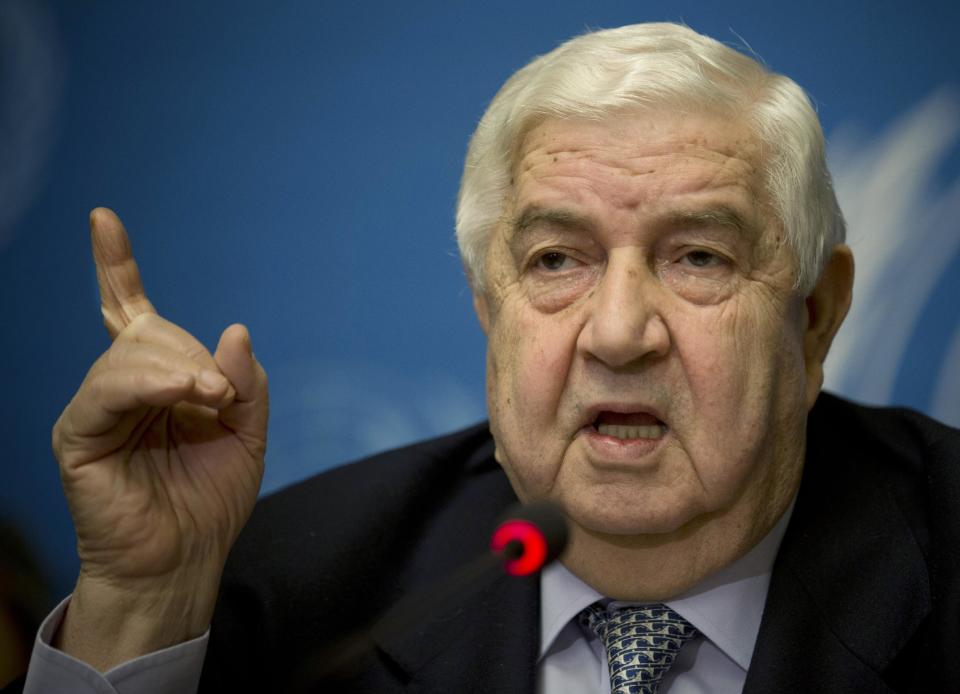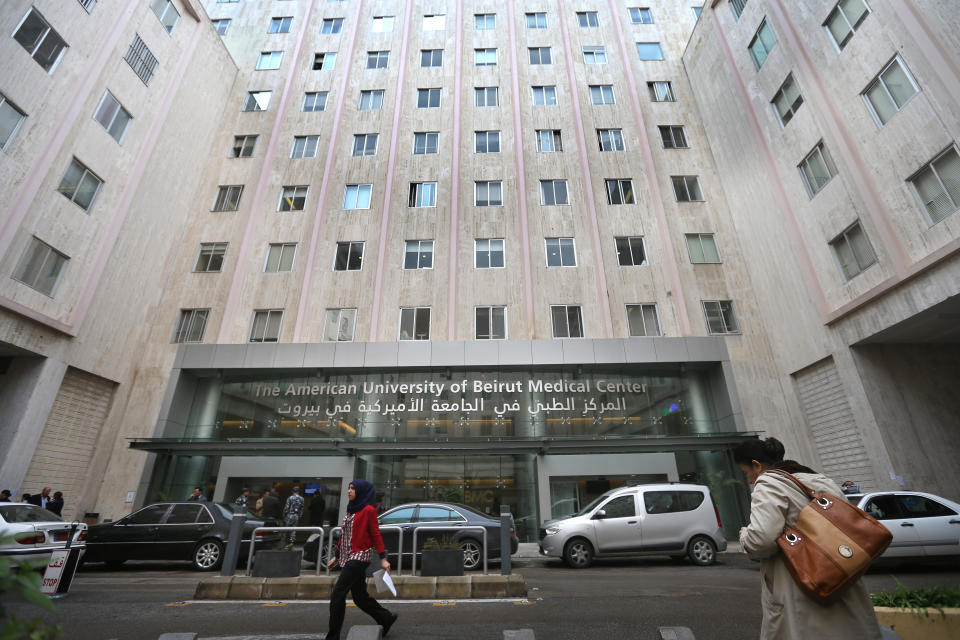Syrian foreign minister rushed to Beirut hospital
BEIRUT (AP) — The Syrian foreign minister was rushed to a Beirut hospital and was undergoing treatment Friday for blocked coronary arteries, Lebanese security officials and a lawmaker said.
Foreign Minister Walid al-Moallem, who is in his 70s, is known for his hard-line stance against the opposition and is a close confidant of President Bashar Assad. It is not clear whether the overweight al-Moallem has had heart problems in the past.
Al-Moallem was brought to the American University of Beirut Medical Center, said Lebanese security officials, who spoke on condition of anonymity as they weren't authorized to speak publicly to journalists.
Lebanese lawmaker Assem Qanso, who visited al-Moallem on Friday, told reporters outside the hospital that Syria's top diplomat is "in stable condition" and would undergo an operation.
"Some of his arteries are blocked. He will undergo an operation and God willing it will be good. It is not dangerous," Qanso, a close ally of the Syrian government, told The Associated Press in brief comments.
The security officials said that al-Moallem walked slowly and unassisted when he arrived at the hospital. Officials at the hospital — which has treated several senior members of Assad's government in the past — refused to confirm that al-Moallem had registered as a patient, saying they give no such information to "third parties."
Lebanese police and plainclothes officers deployed outside the hospital in Beirut. Syria's ambassador to Lebanon, Ali Abdul-Karim Ali, entered the facility earlier Friday morning, presumably to visit al-Moallem. He did not speak to reporters.
A career diplomat, al-Moallem served as ambassador to Washington for nine years, starting in 1990 during Syria's on-and-off peace talks with Israel.
He was appointed foreign minister in 2006, and he has been one of the staunchest defenders of the government's violent crackdown on its opponents since the uprising against Assad began in March 2011.
Al-Moallem led the Syrian government delegation to United Nations-hosted peace talks with the opposition in Switzerland earlier this year. At the opening session, U.N. chief Ban Ki-moon repeatedly asked al-Moallem to step away from the podium when he exceeded his time limit while giving his speech.
"You live in New York. I live in Syria," al-Moallem snapped at the time, ignoring Ban's appeal to conclude his opening remarks.
Meanwhile, Syrian Information Minister Omran al-Zoubi blasted the U.N.-Arab League mediator for Syria, Lakhdar Brahimi, for saying he warned the Syrian government if it goes ahead with scheduled presidential elections, the opposition will probably refuse to participate in a new round of peace talks.
Al-Zoubi told Syrian state television that Brahimi "forgot that he is a mediator between the legitimate Syrian government and the opposition" and he should respect his job as a mediator.
"This interference in Syrian affairs is totally rejected," al-Zoubi said. "Brahimi has no right to implement America's policy in Syria and the decision to hold elections is decided by Syrian authorities and no one can stop these constitutional steps in the country."
Syrian officials say the presidential elections will be held on time, and Assad has suggested he would run again. The poll must be held between 60 and 90 days before Assad's second seven-year term ends on July 17.
On Thursday, the country's parliament approved an electoral law opening the door — at least in theory — to other potential contenders besides Assad.
Also Friday, government forces advanced toward the eastern entrance to the town of Yabroud near the Lebanese border, state TV and the Syrian Observatory for Human Rights activist group said.
Yabroud is the last major rebel-held town in the mountainous Qalamoun region, where Assad's forces have been waging an offensive for months to try to sever rebel supply lines across the porous border into Lebanon.
State TV also said troops ambushed a group of gunmen near the town of Talkalakh near Lebanon's northern border, killing more than 20 of them. It showed footage of dead men, some with rifles next to their bodies.
Meanwhile, the Observatory reported that members of the al-Qaida breakaway group the Islamic State of Iraq and the Levant completed their withdrawal from the northwestern province of Idlib and mountainous areas of the coastal region of Latakia. It said the gunmen moved to the northern provinces of Aleppo and Raqqa.
Islamic State fighters have been fighting members of other rival groups in northern Syria since early January. Activists say the clashes killed more than 3,300 people.
Syria's uprising, which began with largely peace protests, has evolved into a civil war with sectarian overtones. Islamic extremists, including foreign fighters and Syrian rebels who have taken up hard-line al-Qaida-style ideologies, have played an increasingly prominent role among fighters, dampening the West's support for the rebellion to overthrow Assad.
The conflict also has impacted Syria's neighbors. In Lebanon, five people have been killed in clashes since Thursday in the northern city of Tripoli, the state National News Agency said.
Violence related to the war in Syria frequently breaks out between two impoverished rival neighborhoods in Tripoli, one dominated by Sunni Muslims and the other by members of Assad's Alawite sect.
___
Associated Press writer Ryan Lucas contributed to this report.



